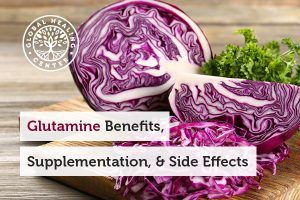
Glutamine is an amino acid that is vitally important to health and well-being. As the most abundant amino acid in the body, it supports more metabolic processes than any other.[1, 2] Glutamine encourages a healthy gut, promotes normal blood sugar levels, and it’s a building block for muscles.[3, 4] In the body, glutamine is stored in skeletal muscle; it circulates in the blood to the kidneys, liver, intestines, and immune cells where it helps perform critical functions.[5]
Benefits of Glutamine
Glutamine supports a number of important functions in the body, including the immune system, the body’s detoxification abilities, gut health, and even muscle growth and repair. Let’s take a closer look at how glutamine enables these actions.
Cell Health
Glutamine is essential for immune and intestinal cell health.[6] It energizes these cells, speeding up the cell division and renewal processes.[7] It’s so important, in fact, that a glutamine deficiency can negatively affect the function of the gut or immune system.[8, 9]
Detoxification and Liver Health
Consuming meat can cause ammonia to build up in the body, negatively affecting the brain and liver. As support for the kidneys and liver, adequate glutamine stimulates the body’s detoxification processes to regulate ammonia levels.[10] Glutamine also promotes liver metabolism and proper pH balance.[11]
Gut Health
The digestive tract has a protective barrier known as the mucosa lining. Without this protection, toxins and harmful organisms could leak from your gut into your body—a condition called leaky gut.[12] Glutamine supports the mucosa lining. So much so that inquiries have been made into the relationship between glutamine and gut health; one study reported that glutamine may reduce occurrences of diarrhea in people with digestive ailments.[13]
Promotes Normal Body Weight
Some illnesses can cause wasting—severe, unintended weight loss. In one study with HIV patients, glutamine proved to be a cost-effective therapy to help maintain body weight. Promoting gut health and improving nutrient absorption are among the methods of action by which glutamine offers this benefit.[14]
Recovery and Immune Health
Because amino acids are the building blocks of muscles, glutamine is a popular supplement among athletes seeking to hasten muscle recovery. Glutamine may also help support endurance during aerobic exercise.[15]
Strenuous exercises like marathon running can wear down a healthy immune system. It’s not uncommon for runners to feel ill following a long race. One double-blind placebo-controlled study had a group of athletes take a glutamine supplement immediately after two hours of intense exercise. During the seven days that followed, the athletes who took the glutamine supplement said they felt better than those who did not.[16]
Other Health Benefits of Glutamine
- Beneficial for some intensive medical treatments.[17]
- Might help support growth hormone levels.[18]
- Preserves gut integrity.[19]
- May help with nutrient absorption.[20]
- Supports brain health.[21]
- Supports normal memory.[22]
- May curb alcohol cravings.[23]
- Supports the body’s ability to heal wounds.[24]
- Helps regulate blood glucose levels.[25]
- Resists harmful organisms.[26]
Best Sources of Glutamine
Glutamine is a nonessential amino acid that your body produces, so you generally don’t need to make an extra effort to seek out dietary sources. Regardless, dietary sources of glutamine include raw vegetables and nuts, as well as meat, eggs, and dairy. Glutamine is also available as a nutritional supplement.
Vegan Food Sources of Glutamine
Below are 10 vegan food sources of glutamine. Be advised that vegetable sources of glutamine should be eaten raw because high heat breaks down glutamine and negatively affects its bioavailability.[27]
- Red Cabbage
- Nuts
- Beans
- Legumes
- Spinach
- Parsley
- Broccoli
- Beets
- Asparagus
Glutamine Supplements
Most healthy adults don’t need to take a glutamine supplement; their body produces enough, and their diet provides some, too. There are some instances, however, where glutamine supplementation may be warranted or desired. Because of its close relationship with muscle mass, glutamine supplements are popular among bodybuilders and weightlifters.[28] Additionally, doctors may recommend supplemental glutamine for gastrointestinal issues or other health concerns.[29]
Glutamine has few, if any, side effects and is generally considered safe. If you and your trusted health care provider decide a glutamine supplement is right for you, choose a plant-based formula from a reputable company. Avoid products with synthetic, animal-based, or artificial ingredients.
Does Dr. Group Take a Glutamine Supplement?
Personally, I don’t take a stand alone glutamine supplement. I follow an organic, plant-based diet that provides the majority of the nutrients I need. To fill any gaps in my diet, I take IntraMAX®. It’s a liquid multivitamin that provides over 415 essential vitamins and minerals (including glutamine), each one derived from natural and organic plant sources. I believe it’s the best, most complete formula available.
Is glutamine part of your supplement routine? If so, what’s your motivation? Leave a comment below and share your thoughts with us.
The post Glutamine Benefits, Supplementation, and Side Effects appeared first on Dr. Group's Healthy Living Articles.
source http://www.globalhealingcenter.com/natural-health/glutamine-benefits/
No comments:
Post a Comment